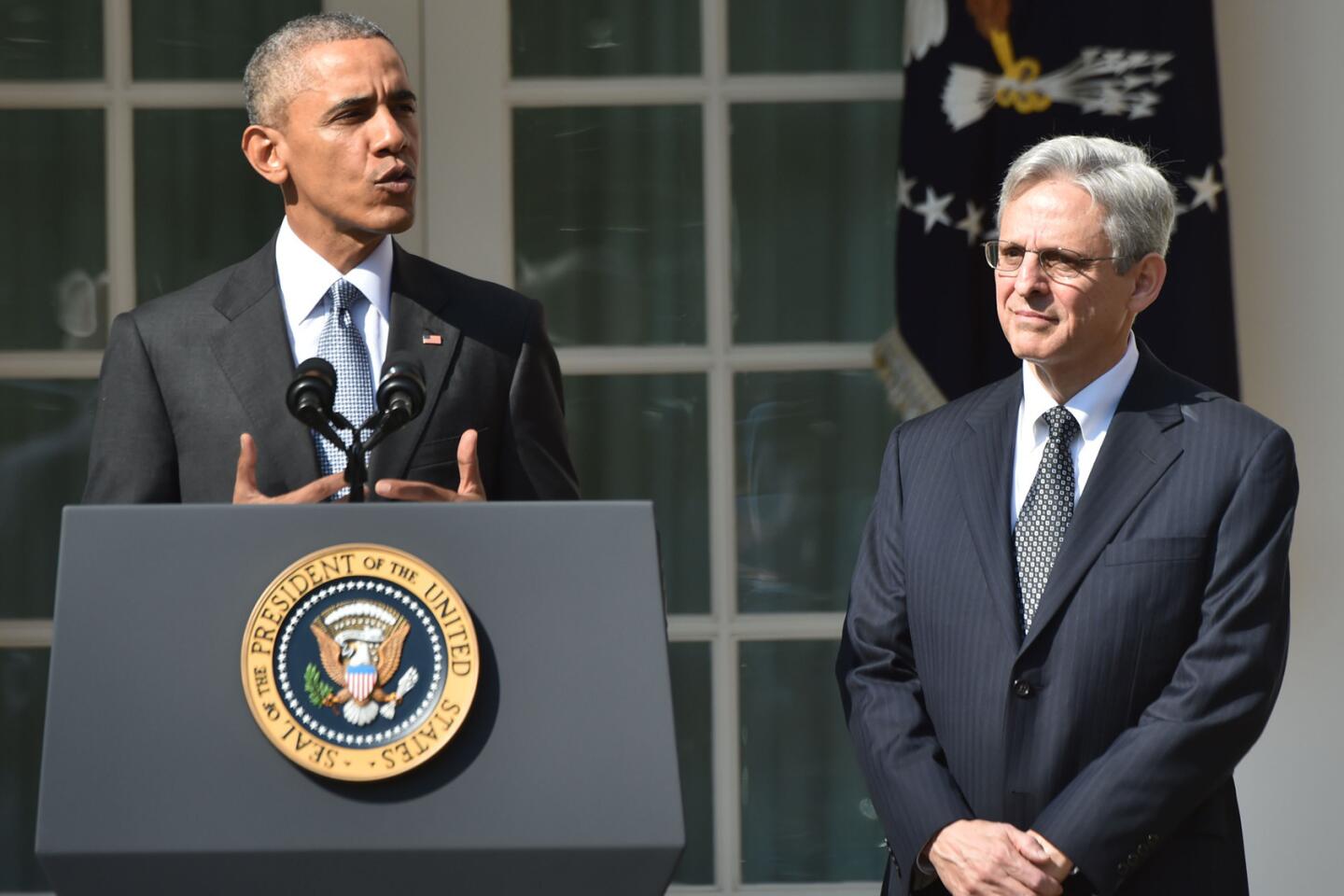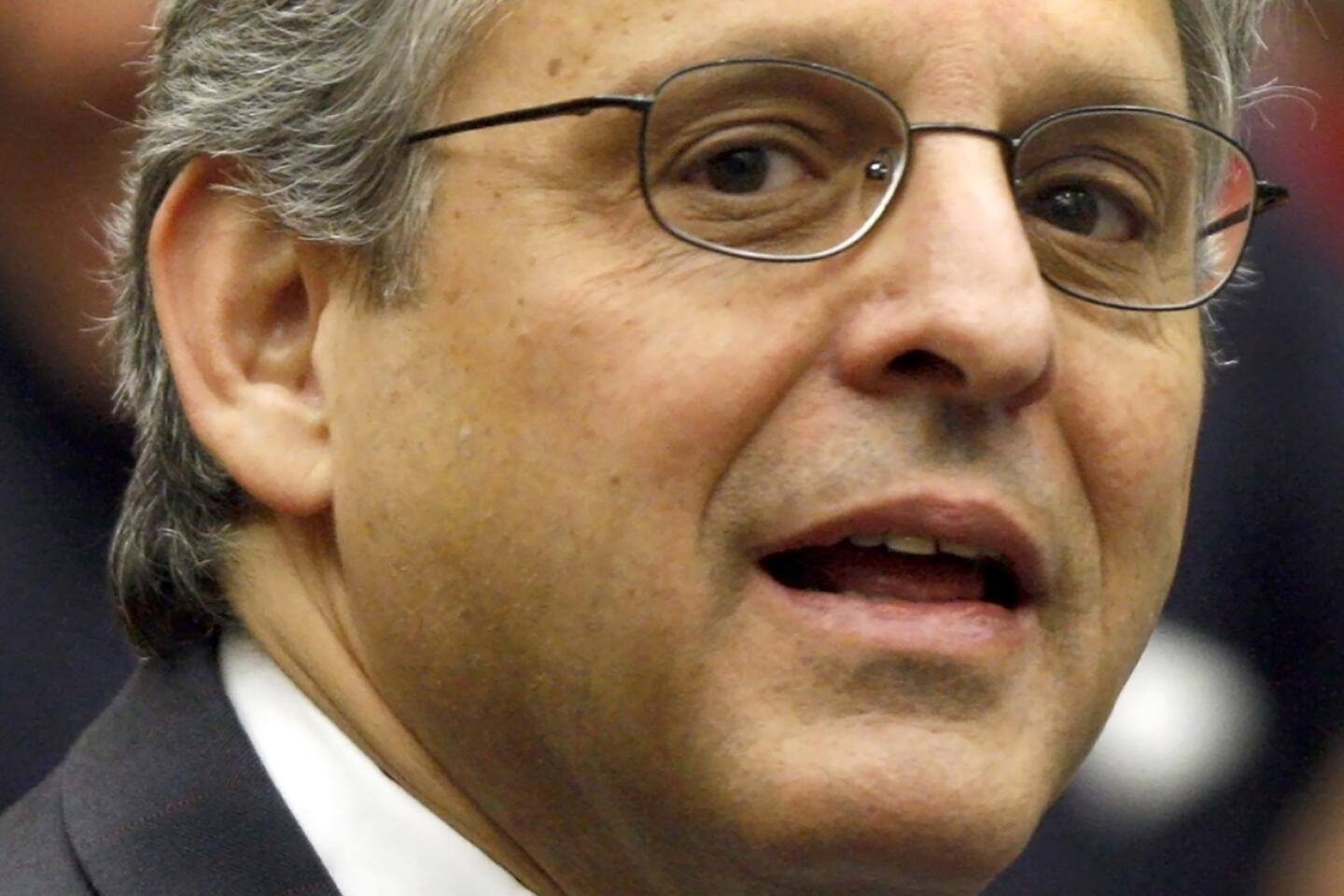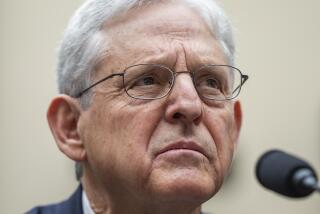Oklahoma City bombing deeply affected Supreme Court nominee Merrick Garland
- Share via
Reporting from Washington — A string of bulletins marked “URGENT” flashed across Merrick Garland’s computer screen on the fourth floor of the Justice Department.
“An explosion was heard,” read the first report of the 1995 Oklahoma City bombing. “Black smoke billowed…. It appears… a massive bomb exploded…. The 9th floor of the federal building is gone.”
Within hours of the bombing, Garland, then one of the senior officials in the Clinton administration Justice Department, was insisting to his bosses that he quickly fly to Oklahoma to lead the investigation into what until then was the worst terror attack on U.S. soil — 168 people, including 19 children, died in the blast.
Within days, Garland, a short man in black-rimmed glasses, was treading somberly among body parts strewn around the still-smoldering building and meeting with surviving victims and the families of the dead. As cadaver dogs and rescue workers scoured the debris for remains, Garland and other prosecutors stood silently as bodies and body parts, covered in sheets, were carried away on stretchers, said Donna A. Bucella, a federal prosecutor also dispatched to Oklahoma City.
“This experience changed you,” she said.
Garland wasted no time. He convened meetings and began issuing orders to ensure the investigative and prosecutorial teams got the resources they needed. Over the next few months of 18-hour days, he never got angry or upset, even when he was forced to see the destruction up close, according to those who worked with him.
“We wanted the investigation to be flawless,” said Jamie Gorelick, who was then the deputy attorney general and Garland’s boss. “We wanted the prosecution to be reflective of the system of justice, and we wanted many parts of Department of Justice to work together smoothly. And [Garland] was the perfect person to do that. He has terrific judgment, he is meticulous and meticulously fair, and he is very collegial and able to lead people to a common goal.”
His efforts led to the eventual conviction of Timothy J. McVeigh, a disgruntled Army veteran and anti-government militant who was executed on June 11, 2001, and accomplice Terry Nichols, who was given life with no parole.
Last year, on the 20th anniversary of the attack, Garland and Bucella spoke on a panel in Oklahoma City. As they recalled the horrific days after the bombing and the human toll it exacted, “everyone’s eyes, including Merrick’s, filled with tears,” she said.
The Oklahoma City bombing is one of several high-profile cases that shaped the career, outlook and reputation of the man now nominated by President Obama to serve on the nation’s highest court.
At 63, Garland is one of the most respected and best-liked judges in Washington, among Republicans as well as Democrats. And he has been seen as a potential Supreme Court nominee since the late 1990s just years after his work on the Oklahoma City bombing case helped win him appointment to the U.S. Court of Appeals for the District of Columbia Circuit.
Obama considered Garland for the high court during his first term, but decided to keep him in reserve in case Democrats lost the Senate majority and Obama needed a nomination that Republicans would have difficulty defeating.
“I need a play I can run in 2011 or 2012,” Obama told an advisor, according to the 2012 book “The Oath: The Obama White House and the Supreme Court.”
Instead, Obama in previous Supreme Court appointments nominated Sonia Sotomayor and Elena Kagan, two younger, left-leaning women who had little difficulty winning confirmation under the then-Democratic-controlled Senate.
In 2014, Republicans won Senate majority, and on Wednesday, Obama decided the current tough political climate meant it was time to finally bring out Garland’s nomination.
Because of his age, Garland was seen by many as too old for the high court. Presidents nowadays prefer to elevate younger judges, in their 40s and 50s, who can have an impact on the Supreme Court for several decades. If confirmed, he would be the oldest justice in more than four decades to join the court.
It would also mark the first time the court has had four Jewish justices. The other five justices are Catholics.
From a strictly professional standpoint, Garland, as chief judge of the D.C. Circuit, can claim to be the American jurist most qualified to move up to the Supreme Court. That appeals court is widely seen as the nation’s second most-powerful court and is a frequent stepping stone to the Supreme Court.
For Garland, the promotion would involve moving a just few blocks away from his current courtroom on Capitol Hill.
But both physically and politically, his path to the Supreme Court must now pass through the U.S. Senate building. And whether he can complete the short trip remains unclear.
The appeals court for the D.C. Circuit handles mostly regulatory disputes, not controversies that divide the Supreme Court, such as abortion, the death penalty or gay marriage.
Garland has usually voted to uphold government regulations against industry challenges in areas such as environmental protection, consumer protections and worker’s rights. He also usually votes to uphold criminal convictions.
A moderate-to-liberal jurist, Garland often has found a way to work with the court’s Republican appointees, who until recently held the majority on the D.C. Circuit.
He is known for asking probing questions of lawyers, but in a courteous manner. And his opinions are careful and moderate in tone, often narrowly crafted to garner more support.
“He’s a judge’s judge,” said U.S. District Judge Royce C. Lamberth, who previously worked with Garland as a federal prosecutor. Lamberth noted that he has been overturned a number of times by Garland, but he never held a grudge because the appellate judge was always kind, even when tearing apart one of his rulings. “He is a total gentleman, always,” Lamberth said.
Garland was born and raised in Chicago; his father ran a small business out of their home. A high school valedictorian, Garland earned a Harvard scholarship, graduated summa cum laude and put himself through Harvard Law School by working as a tutor and stocking shelves in a shoe store.
After clerking for 2nd Circuit Judge Henry Friendly and then Supreme Court Justice William Brennan, Garland went into private practice for several years. But in 1989 he took a 50% pay cut to take a job as a federal drug prosecutor in the administration of President George H.W. Bush.
“He walked away from a comfortable and lucrative law practice to return to public service,” Obama noted Wednesday.
He quickly made a name for himself as a federal prosecutor at the U.S. Attorney’s Office in D.C. and later in the Justice Department. In addition to the Oklahoma City case, Garland oversaw the investigation and prosecution of the so-called Unabomber, Theodore Kaczynski, and the federal investigation into the 1996 Olympics bombing in Atlanta.
Garland earned a reputation for being assertive, hands-on and someone who took his cases personally.
After leaving the U.S. Attorney’s Office in Washington to take a position at Justice, he learned one of his former prosecutions was being appealed. Since he knew the ins-and-outs of the case so well, he called the prosecutor in charge of the appeal and asked if he could take over the arguments.
“I let him do it and he was brilliant,” said Mary Pat Brown, a former top federal public corruption prosecutor who worked with Garland. “He just really cared about the case.”
Even later as a judge, Brown recalled that Garland often insisted that many lawyers call him by his first name rather than “judge.” “He is charming, funny, smart, very friendly,” Brown said. “He definitely is unassuming.”
In 1995, President Clinton nominated him to the appeals court, though he wasn’t confirmed until 1997.
A former colleague, Amy Jeffress, worried he might go stir crazy in the new post. At the time, Jeffress was working with Garland in the deputy attorney general’s office, and Garland had one the toughest assignments: making sure the Justice Department’s trains ran on time.
“He was constantly moving, going from office to office, checking to make sure everything was working,” Jeffress said. “He was a very energetic person. He was a very engaged manager, though not at all a tyrant. Everybody liked working for him. And so I worried he might not be happy on the appeals courts. It’s a more studious kind of job, with a lot more time in your own chambers. I was wrong.”
Jeffress believes Garland’s energy and low-key style helped him build friendships among fellow judges of all ideological stripes and, thus, has helped reduce a level of acrimony that was well-known among legal professionals.
“He is a very warm person,” she said, noting that Garland even helped play matchmaker by encouraging her future husband to ask her on a date and then officiated at their wedding.
After being introduced in the Rose Garden Wednesday, Garland briefly choked up as he began his remarks, calling his nomination the “greatest honor of my life, other than Lynn agreeing to marry me 28 years ago.” The couple have two daughters, Becky and Jessie.
Garland is familiar with difficult confirmation battles. After Clinton nominated him to the D.C. Circuit, Republicans moved to block the appointment, not because they questioned Garland’s qualifications, but because they objected to a Democratic president filling another seat on the appeals court.
Even so, Garland won over Republicans. Sen. Orrin G. Hatch of Utah, then the Republican chairman of the Judiciary Committee, spoke glowingly in 1997 of Garland.
“To my knowledge, no one, absolutely no one disputes the following: Merrick B. Garland is highly qualified to sit on the D.C. circuit. His intelligence and his scholarship cannot be questioned,” Hatch said during an executive session of his committee.
“Mr. Garland’s experience, legal skills, and handling of the Oklahoma City bombing case have earned him the support of officials who served in the Justice Department during the Reagan and Bush administrations,” Hatch added.
Frank Keating, the governor of Oklahoma at the time of 1995 bombing, was among other Republican leaders who endorsed Garland’s nomination to the appellate bench: “Merrick Garland is an intelligent, experienced and evenhanded individual,” Keating said.
James Cole, a former deputy attorney general who knows Garland well, said the president could not have picked a better nominee to endure what is sure to be a difficult confirmation battle. Garland fights for what he believes in, has a passion for public service and is not the type to take a rough confirmation battle personally, Cole said.
“Just because it’s hard, that doesn’t mean Merrick isn’t going to do it,” Cole said. “It’s just another one of the hard things he has done in his career. He believes in public service.... He may be one of the few people who can really go through this process with a fair amount of dignity and professionalism and not engage at the base level, and try to keep conversation on a high intellectual level.”
On Twitter: @DavidGSavage
ALSO
Donald Trump: Senate leaders should block Obama’s Supreme Court choice
Democrats see the middle as the right path on Supreme Court nominee
Sen. Boxer hadn’t expected her final months in Senate would include Supreme Court fight
More to Read
Sign up for Essential California
The most important California stories and recommendations in your inbox every morning.
You may occasionally receive promotional content from the Los Angeles Times.













